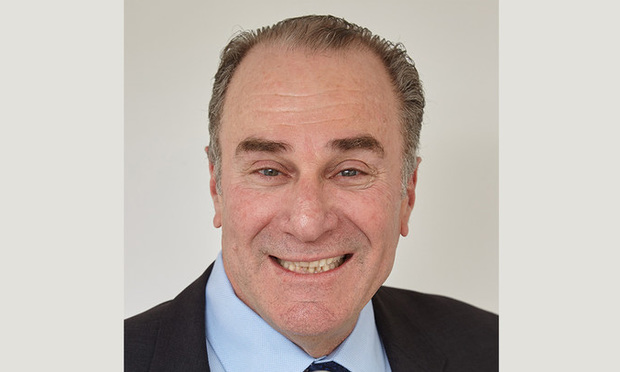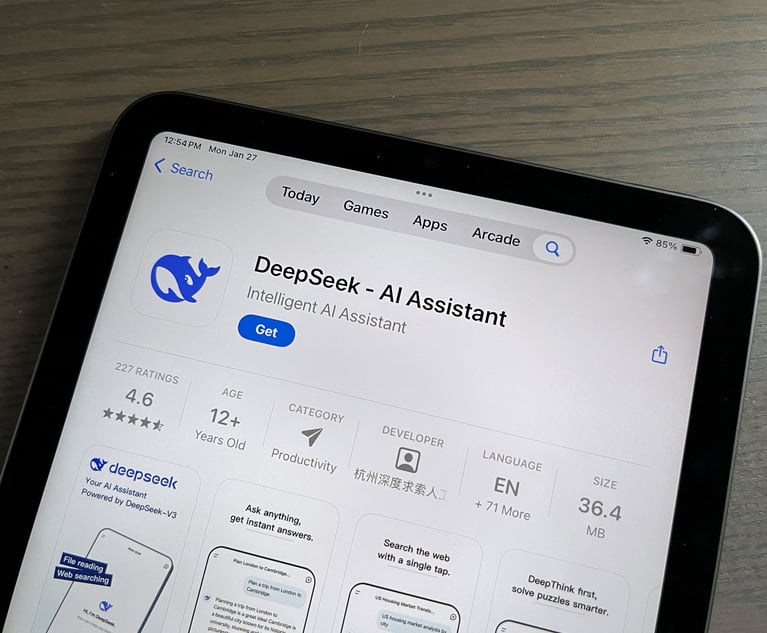When Corporate Greed Is Good for Workers
A funny thing happened on the way to making the wealthy even wealthier: Workers' lives improved. It wasn't because corporate titans suddenly saw the light and decided to change their ways. It was strictly a pocketbook issue.
June 24, 2019 at 03:15 PM
4 minute read
 Gerald Sauer, Sauer & Wagner (Photo: Courtesy photo)
Gerald Sauer, Sauer & Wagner (Photo: Courtesy photo)
A funny thing happened on the way to making the wealthy even wealthier: Workers' lives improved. It wasn't because corporate titans suddenly saw the light and decided to change their ways. It was strictly a pocketbook issue.
Businesses exist to make money. From child labor to exposing workers to harmful chemicals, nothing that helped the bottom line has ever been off the table. In the last century, lawmakers began changing the landscape—placing human lives and personal welfare over corporate profits—when public sentiment called for change.
In today's marketplace, economics are the tail that wags the dog of public benefit. Workers comp costs forced employers to make workplaces safer, coincidentally reducing fatality rates by about a third. Workers were gifted on-site gyms and anti-obesity programs when medical costs took too big a bite out of corporate profits. Employee absenteeism and its attendant costs steered companies toward on-site childcare and more generous telecommute policies.
#MeToo is the cause de jour. It's been good news for workers: more open communication channels, well-publicized anti-harassment policies, targeted training for managers and peers. Companies didn't come on board because it was politically correct but because harassment is expensive and time-consuming. Boards really don't want to deal with besmirched reputations and cratered stock prices.
#MeToo has also become the sine qua non of investment. When you're sinking good money into a company—whether a new startup or a well-established institution—you do your due diligence. With a team of lawyers and accountants, you perform a colonoscopy on the company's financials because you can't afford to make a mistake. Why wouldn't you perform the same level of scrutiny on every other aspect of that company, including the activities of its key management?
Acquirers have a right to know what they're getting, especially when it comes to sexual harassment. They want an insurance policy that puts the onus on the seller to come clean and make good if there's a Weinstein in the house.
Years ago, when I was a litigator in the entertainment industry, I observed the way deals were restructured to reflect the rapid pace of technological change in the industry. Well-known buyers had lost significant money by failing to include new developments, such as videos, in their due diligence. The new agreements were drafted in a way that expressly anticipated all possible future technologies. I learned that it's easier to take action on the front end than after the fact.
Now the prudent buyer's lawyer includes a morals clause in the merger agreement and maybe a clawback provision that helps the client get back money paid if later revelations damage the brand, or a holdback so the buyer doesn't have to sue to get money back. The last thing the buyer wants is to inherit a costly harassment claim; the first thing the seller wants is to get top dollar. Neither wants to pay the price of an unexpected surprise. The happy byproduct is that the company looking for investment or purchase will take proactive steps to make sure nothing happens.
This is no longer about what happens when the acquirer has heard rumors. I predict it will be standard procedure in all investment deals. Sexual-harassment diligence, like entertainment technology diligence years ago, will soon be a routine part of M&A due diligence. There's always risk when buying a company, and everyone's replaceable, but fewer skeletons in the closet make for a much better deal all around.
For the rank-and-file workers, it really doesn't matter what terms were in the due diligence disclosure. All that matters for them is that issues that can impact their daily workplace existence are being addressed, not swept under the rug. If laws are enacted to codify these protections, all the better.
It's a yin/yang that all boils down to the dollar. Current events impact economics, companies change practices to protect bottom lines, and laws ultimately are enacted that make it difficult for the companies to revert to past bad behaviors. Most importantly, light is shined on a problem that has been kept for too long in a dark place. It may all be purely reactive, but it effectuates change.
Let's all raise our glasses to corporate greed.
Gerald Sauer is a founding partner at Sauer & Wagner LLP of Los Angeles. He focuses his practice on intellectual property, employment and business law.
This content has been archived. It is available through our partners, LexisNexis® and Bloomberg Law.
To view this content, please continue to their sites.
Not a Lexis Subscriber?
Subscribe Now
Not a Bloomberg Law Subscriber?
Subscribe Now
NOT FOR REPRINT
© 2025 ALM Global, LLC, All Rights Reserved. Request academic re-use from www.copyright.com. All other uses, submit a request to [email protected]. For more information visit Asset & Logo Licensing.
You Might Like
View All
Growth of California Firms Exceeded Expectations, Survey of Managing Partners Says
5 minute read
The Time Is Now for Employers to Assess Risk of Employees’ Use of DeepSeek
4 minute read
Loopholes, DNA Collection and Tech: Does Your Consent as a User of a Genealogy Website Override Another Person’s Fourth Amendment Right?
Trending Stories
- 1Rejuvenation of a Sharp Employer Non-Compete Tool: Delaware Supreme Court Reinvigorates the Employee Choice Doctrine
- 2Mastering Litigation in New York’s Commercial Division Part V, Leave It to the Experts: Expert Discovery in the New York Commercial Division
- 3GOP-Led SEC Tightens Control Over Enforcement Investigations, Lawyers Say
- 4Transgender Care Fight Targets More Adults as Georgia, Other States Weigh Laws
- 5Roundup Special Master's Report Recommends Lead Counsel Get $0 in Common Benefit Fees
Who Got The Work
J. Brugh Lower of Gibbons has entered an appearance for industrial equipment supplier Devco Corporation in a pending trademark infringement lawsuit. The suit, accusing the defendant of selling knock-off Graco products, was filed Dec. 18 in New Jersey District Court by Rivkin Radler on behalf of Graco Inc. and Graco Minnesota. The case, assigned to U.S. District Judge Zahid N. Quraishi, is 3:24-cv-11294, Graco Inc. et al v. Devco Corporation.
Who Got The Work
Rebecca Maller-Stein and Kent A. Yalowitz of Arnold & Porter Kaye Scholer have entered their appearances for Hanaco Venture Capital and its executives, Lior Prosor and David Frankel, in a pending securities lawsuit. The action, filed on Dec. 24 in New York Southern District Court by Zell, Aron & Co. on behalf of Goldeneye Advisors, accuses the defendants of negligently and fraudulently managing the plaintiff's $1 million investment. The case, assigned to U.S. District Judge Vernon S. Broderick, is 1:24-cv-09918, Goldeneye Advisors, LLC v. Hanaco Venture Capital, Ltd. et al.
Who Got The Work
Attorneys from A&O Shearman has stepped in as defense counsel for Toronto-Dominion Bank and other defendants in a pending securities class action. The suit, filed Dec. 11 in New York Southern District Court by Bleichmar Fonti & Auld, accuses the defendants of concealing the bank's 'pervasive' deficiencies in regards to its compliance with the Bank Secrecy Act and the quality of its anti-money laundering controls. The case, assigned to U.S. District Judge Arun Subramanian, is 1:24-cv-09445, Gonzalez v. The Toronto-Dominion Bank et al.
Who Got The Work
Crown Castle International, a Pennsylvania company providing shared communications infrastructure, has turned to Luke D. Wolf of Gordon Rees Scully Mansukhani to fend off a pending breach-of-contract lawsuit. The court action, filed Nov. 25 in Michigan Eastern District Court by Hooper Hathaway PC on behalf of The Town Residences LLC, accuses Crown Castle of failing to transfer approximately $30,000 in utility payments from T-Mobile in breach of a roof-top lease and assignment agreement. The case, assigned to U.S. District Judge Susan K. Declercq, is 2:24-cv-13131, The Town Residences LLC v. T-Mobile US, Inc. et al.
Who Got The Work
Wilfred P. Coronato and Daniel M. Schwartz of McCarter & English have stepped in as defense counsel to Electrolux Home Products Inc. in a pending product liability lawsuit. The court action, filed Nov. 26 in New York Eastern District Court by Poulos Lopiccolo PC and Nagel Rice LLP on behalf of David Stern, alleges that the defendant's refrigerators’ drawers and shelving repeatedly break and fall apart within months after purchase. The case, assigned to U.S. District Judge Joan M. Azrack, is 2:24-cv-08204, Stern v. Electrolux Home Products, Inc.
Featured Firms
Law Offices of Gary Martin Hays & Associates, P.C.
(470) 294-1674
Law Offices of Mark E. Salomone
(857) 444-6468
Smith & Hassler
(713) 739-1250







